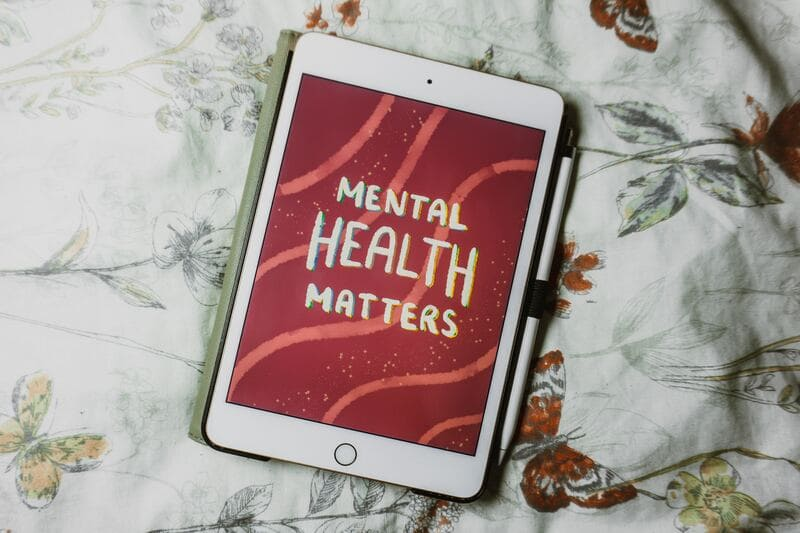
How ZMA Can Boost Your Immune System
Wondering how to boost your immune defences and fight against illness? Discover the science of ZMA and how it can help your immune system.

Today, we delve into a topic that is often shied away from – men’s mental health.
This guide will provide genuine, science-backed advice, blended with a dash of our StayPrime no-nonsense approach.
Mental health problems are a reality for many men, yet these challenges often go unspoken and unaddressed.

There’s no shame in acknowledging mental health issues, whether it’s stress, anxiety, depression, or other struggles that life may throw at us. The key findings from recent research reveal that a significant number of men in the UK, and indeed globally, grapple with these difficulties.
Over the next several sections, we’ll present 11 practical, immediate steps you can take to start addressing mental health concerns today. This is not about quick fixes or miracle cures; it’s about acknowledging the importance of small, daily improvements that can gradually contribute to better mental health over time.
Let’s embark on this journey together, taking the first steps towards understanding and improving our mental health.
Every positive change, no matter how small, is a step in the right direction.
Let’s get started.

The culture of silence around men’s mental health is a heavy burden. As highlighted by a Priory Group survey, 77% of men have suffered common mental health symptoms like anxiety, stress or depression.
Alarmingly, 40% of these men have never spoken to anyone about their mental health. For many, it’s a matter of embarrassment or the perceived stigma that keeps them silent.
Perhaps even more troubling, around three-quarters of all suicides in the UK are men, according to official statistics. It’s a stark reminder that the consequences of this silence can be severe.
Speaking up about your struggles isn’t a sign of weakness; it’s a sign of strength. It’s a true display of courage to acknowledge your vulnerabilities and share them with others.
How to Start Today: Reach out to someone you trust – it could be a friend, family member, or mental health professional. Speak openly about what you’ve been feeling worried or stressed about. Remember, sharing your experiences is the first step towards recovery and it can make a big difference in how you manage your mental health problems. Don’t be afraid to seek the right support. Life is too short to keep your struggles to yourself.
So, go ahead. Let it all out in the easiest way possible. That might just be a text message to start with – make this process as easy as possible to begin.

Exercise isn’t just about building muscle or shedding pounds. It’s a scientifically proven method of combating poor mental health.
Regular physical activity can help reduce feelings of anxiety and depression, enhance mood, and improve self-esteem.
As an added bonus, it’s also fantastic for your overall health, from heart function to brain health.
Here’s an eye-opening fact: a study showed that, on average, a person has 3.4 poor mental health days per month. But among those who exercise, the number of poor mental health days dropped by more than 40 percent, as stated in a UCLA Health report.
Start small – even ten press-ups and ten sit-ups can make a difference. Take a short walk around your neighbourhood, or cycle to your local shops instead of driving. Make it a part of your daily routine and gradually increase the intensity and duration of your workouts. Every bit of movement counts, so get your heart rate up and your endorphins flowing.
Remember, progress is progress, no matter how small. You don’t have to run a marathon right out of the gate. Make a commitment to sweat a little every day and you’ll start to see the benefits in no time.

Our thoughts have immense power over our feelings and actions. Negative thought patterns can contribute to poor mental health, amplifying feelings of anxiety and depression. That’s why one of the most effective strategies for managing mental health issues is to reframe our thinking.
Cognitive Behavioural Therapy (CBT), a form of talk therapy, has been shown to be highly effective in treating men’s mental health issues. It helps you to identify negative thought patterns and reframe them in a positive light.
Whenever you notice a negative thought creeping in, stop and analyse it. Is it based in reality or is it a product of worry or fear? Challenge this thought and try to replace it with a positive one. This practice won’t eliminate negative thoughts overnight, but with consistency, it will help you develop a healthier, more positive mindset over time.
A word of caution: if your negative thoughts are persistent or causing you distress, it’s important to seek help from a mental health professional.

We’re all familiar with the saying, “you are what you eat”. But, did you know that this adage applies to your mental health as well? The role of nutrition in mental health is substantial, and often under appreciated.
Scientists have found links between low levels of certain nutrients — such as folate, magnesium, iron, zinc, and vitamins B6, B12, and D — and worsening mood, feelings of anxiety, and the risk of depression. In other words, the food we consume can directly impact our mental well-being.
Start by making healthier choices in your daily diet. Include plenty of fruits, vegetables, lean proteins, and whole grains. Avoid overly processed foods, excessive caffeine and alcohol, which can adversely affect your mental health.
The key nutrients mentioned above are crucial for mental health. But, getting them in the right amounts can be challenging. That’s where supplements come in. For instance, we’ve designed a product, ZMAN+, specifically for men. It’s packed with essential nutrients like zinc, magnesium, vitamin B6, and vitamin D3, which are all known for their role in maintaining good mental health as well as boosting testosterone and supporting energy and recovery.
Remember, treating your body right includes nourishing it with the right foods and supplements. When you feel good physically, you’re more likely to feel good mentally. It’s all interconnected.

You’ve heard it before, but we’ll say it again: quality sleep is not optional—it’s vital.
When we skimp on sleep, it doesn’t just lead to dark circles and extra caffeine; it can have serious implications for our mental health.
Getting your sleep schedule in order is no overnight task, but there are immediate steps you can take. First, set up a sleep-friendly environment. This might mean darkening your room with blackout curtains, reducing noise with earplugs or a white noise machine, and ensuring your room temperature is cool and comfortable.
Your behaviours also play a crucial role. Establish a consistent sleep routine – going to bed and waking up at the same time each day.
Yes, this applies even on weekends.
Your body craves consistency, and a regular sleep schedule can contribute to better quality sleep.
A word of caution about bedtime habits: steer clear of heavy meals, alcohol, and caffeine near bedtime, as they can disrupt your sleep. And remember, your bed should be reserved for two things: sleep and that other “S” thing – no SCREENS.
Remember, it’s not just about the quantity of sleep but also the quality. Good sleep is a pillar of good health, and good health is the ultimate form of self-care for men. So, go on and prioritise that shut-eye. Your mental health depends on it.

Stress is like that unwanted party guest who never seems to leave. It’s always lurking around, and if left unchecked, can wreak havoc on your mental health. Stress can lead to a whole host of mental health issues, from anxiety and depression to irritability and trouble focusing.
Now, we’re not suggesting you go off and live a monk-like existence, free from all worldly worries. That’s neither practical nor possible. What we suggest is developing effective stress management strategies. These might look different for everyone, but a few good places to start include practicing mindfulness, meditation, or yoga, adopting deep breathing exercises, or even simply taking time each day to do something you enjoy.
One overlooked method to tackle stress is learning to say “no” more often. Remember, it’s okay to put your mental well-being first.
Stress can feel all-consuming, but it doesn’t have to control your life. Adopting effective stress management strategies can help you stay one step ahead, keeping your mental health in check. So, tell stress to take a hike – your brain and your testosterone levels will thank you for it.

Humans are social creatures. We crave connection and companionship, and maintaining healthy relationships can have a profound impact on our mental health.
Isolation and loneliness can lead to feelings of depression and anxiety, but having a strong network of friends and family can provide support during difficult times.
You don’t need a bustling social calendar to forge meaningful connections. Even small steps, like calling an old friend, scheduling a video chat with a family member, or striking up a conversation with a neighbour can be a good start.
Joining local clubs, societies or online groups that align with your interests can also open the door to new connections.
And remember, while it’s important to lean on your network when you’re feeling low, try to reciprocate the support when they’re in need. It’s a two-way street. Building and nurturing relationships is a crucial part of men’s mental health, so pick up the phone or fire off that text – your mental well-being will be better for it.

In today’s hyper-connected world, our smartphones are almost always within arm’s reach. They’re the first thing we check in the morning and the last thing we look at before bed.
However, this constant digital consumption can lead to increased stress, anxiety, and feelings of being overwhelmed, recent studies have proven it
You don’t have to go cold turkey and banish your phone to a drawer. Instead, start small. Turn off all unnecessary notifications or, even better, put your phone on “Do Not Disturb” mode for an hour each day.
Carve out some technology-free time in your schedule and stick to it. You may be surprised at the mental clarity and peace that comes from simply disconnecting for a while.
Embracing a digital detox now and then can help recalibrate your relationship with technology and give your brain a much-needed break. So go ahead and hit that ‘Do Not Disturb’ button – your mental health will thank you for it.

We often associate self-care with indulgent spa days or pricey holidays, but the truth is, self-care can be simple, inexpensive, and incredibly effective for supporting mental health.
It’s about taking time out of your day to do something that brings you joy, reduces stress, and helps you reconnect with yourself.
Men, you can start practicing self-care today. Dedicate 15 minutes to doing something you love, whether that’s reading a book, playing an instrument, or simply sitting quietly with a cup of tea.
Perhaps you could explore self-care products designed specifically for men. A soothing face mask, a relaxing bath soak, or even our StayPrime ZMAN+ supplement can be part of your self-care routine. The act of caring for your body can also have a positive impact on your mind.
Remember, self-care isn’t selfish; it’s a necessary part of maintaining good mental health. So men, make self-care a priority and notice the difference it can make to your overall well-being.

Spending time in nature can have a surprisingly powerful effect on your mental health. It can reduce feelings of stress, increase feelings of happiness, and even help to alleviate symptoms of depression.
Plus, it provides a great opportunity to step away from digital devices and simply breathe in the fresh air.
You don’t need to plan a hiking trip or beach day to experience the benefits of nature. Spend just 10 minutes outside in your nearest green space today, whether that’s a backyard, park, or even just a tree-lined street.
Take notice of the sounds around you, the feeling of the breeze on your skin, the scent of the grass or flowers. This practice of mindfulness, combined with the healing powers of nature, can offer a much-needed mental health boost.
Remember, spending time in nature is not about achieving anything or ticking off a to-do list. It’s about being present, connecting with the world around you, and taking a moment to simply be. So take that moment today, men, and experience the difference it can make.

The importance of professional help in addressing mental health problems cannot be overstated. Therapists, counsellors, and psychologists are trained to help you navigate through your feelings, understand your thought patterns, and develop effective strategies to cope with life’s challenges.
If you aren’t able to help yourself with the tips in this post, get help!
Don’t be afraid to seek professional help, men. Many men feel there’s a stigma around therapy, but it’s essential to remember that there’s no shame in needing support.
If you’re ready to explore this option, start researching online platforms that provide therapy services. Many platforms today offer virtual sessions, providing flexibility and privacy.
Alternatively, book an appointment with a local therapist. It’s the first step in what could be a life-changing journey. Remember, getting help is not a sign of weakness, but rather a step towards taking control of your mental health and your life. It’s one of the most courageous things a man can do.

We can’t end this guide to men’s mental health without some of your most frequently asked questions – so here they are:
1. How can a man pamper himself at home?
Self-care isn’t just for women, men deserve pampering too! It can be as simple as taking a long bath, investing in a grooming kit, or even just taking the time to read a book or watch your favourite TV series.
You might also consider activities like yoga or meditation, or indulging in a hobby you enjoy.
Remember, self-care isn’t selfish, it’s essential for your mental health.
2. What self-care products should men use?
Every man is unique and therefore the products you might use for self-care can vary. However, a good skincare routine can be a great place to start, as taking care of your physical appearance can have a positive impact on your mental health too.
Products can range from facial cleansers, moisturisers, exfoliants, to beard oils for those sporting facial hair. Of course, let’s not forget about supplements too, packed with essential nutrients that support your overall well-being.
3. What is the common mental health problem in men?
The most common mental health problems in men include depression, anxiety, and substance use disorder. Men may also experience other issues like bipolar disorder, schizophrenia, or PTSD (post-traumatic stress disorder).
Remember, it’s okay to speak openly about mental health, seeking help is a sign of strength, not weakness.
4. What are the signs of a male mental breakdown?
Signs may include feeling worried or overwhelmed, irritability, sleep problems, losing interest in activities, changes in appetite, trouble focusing, feelings of worthlessness, and potentially suicidal thoughts.
If you notice these signs in yourself or others, immediate help should be sought.
5. What can men do for their mental health?
There’s no one-size-fits-all answer, but making lifestyle changes can make a big difference. Regular exercise, a healthy diet, good sleep hygiene, reducing alcohol and caffeine, spending time with friends and family, and practising mindfulness are all beneficial.
Speaking to a professional can also provide the right support and tools to manage mental health.
6. Why is men’s mental health not taken seriously?
Men’s mental health is taken seriously, but societal norms and stigma can sometimes make it seem otherwise. Many men feel the pressure to be strong and silent about their struggles.
We at StayPrime are dedicated to changing this narrative, encouraging men to speak openly and seek help when needed.
7. How many men suffer from mental health in the UK?
According to the Mental Health Foundation, one in eight men in the UK has a common mental health problem such as depression, anxiety, panic disorder, or obsessive-compulsive disorder (OCD).
In addition, men are three times more likely than women to become alcohol dependent and are three times as likely to report frequent drug use.
8. What are the signs of mental health in men?
Signs of mental health issues in men can include feeling low, persistent sadness, irritability, loss of interest in activities, fatigue, changes in appetite or weight, trouble sleeping, lack of concentration, and feeling hopeless. It’s important to note that symptoms can vary and if you’re feeling worried about any changes, it’s essential to seek professional advice.
9. What are common mental health issues in men?
The most common mental health issues in men include depression, anxiety, and substance use disorder. However, there are many different mental health issues that men can face, including eating disorders, schizophrenia, and bipolar disorder.
10. What causes poor mental health in men?
There’s no single cause of poor mental health. It can be a combination of genetic, biochemical, environmental, and psychological factors.

Men’s mental health is a serious issue that requires our utmost attention and action. The numbers are not just statistics; they represent real men – our fathers, brothers, sons, friends, and colleagues, who may be quietly struggling with mental health issues.
It’s crucial to challenge the outdated notion that “real men don’t cry” or that discussing feelings is a sign of weakness. In reality, acknowledging your emotions, speaking openly about your mental health, and seeking support when necessary are acts of strength and self-awareness.
Remember, it’s okay to not be okay. Taking the first step towards improvement, no matter how small, is a big achievement. Consider incorporating our 11 immediate actions into your life, understanding that it’s the accumulation of these small changes that can lead to significant improvement over time.
Above all, you are not alone.
It’s essential to reach out if you’re feeling low for more than two weeks, or if your feelings of worry, stress, and anxiety are becoming overwhelming. Don’t let fear or stigma hold you back – the right support can make a significant difference in your life.
With patience, perseverance, and the right approach, better days are ahead. Remember, your mental health matters.
It’s time we, as a society, talk about it more openly and supportively.
You’re worth it.


Wondering how to boost your immune defences and fight against illness? Discover the science of ZMA and how it can help your immune system.

Learn how ZMA can transform your muscle recovery and athletic performance, allowing you to reach your health goals

Studies have shown that testosterone levels are falling. Read this to find out why and what can be done to fix it.

Discover how Vitamin B6 reduces fatigue through energy metabolism, with key facts and intake recommendations.

Complete the form NOW to receive the free ebook and take on the challenge.